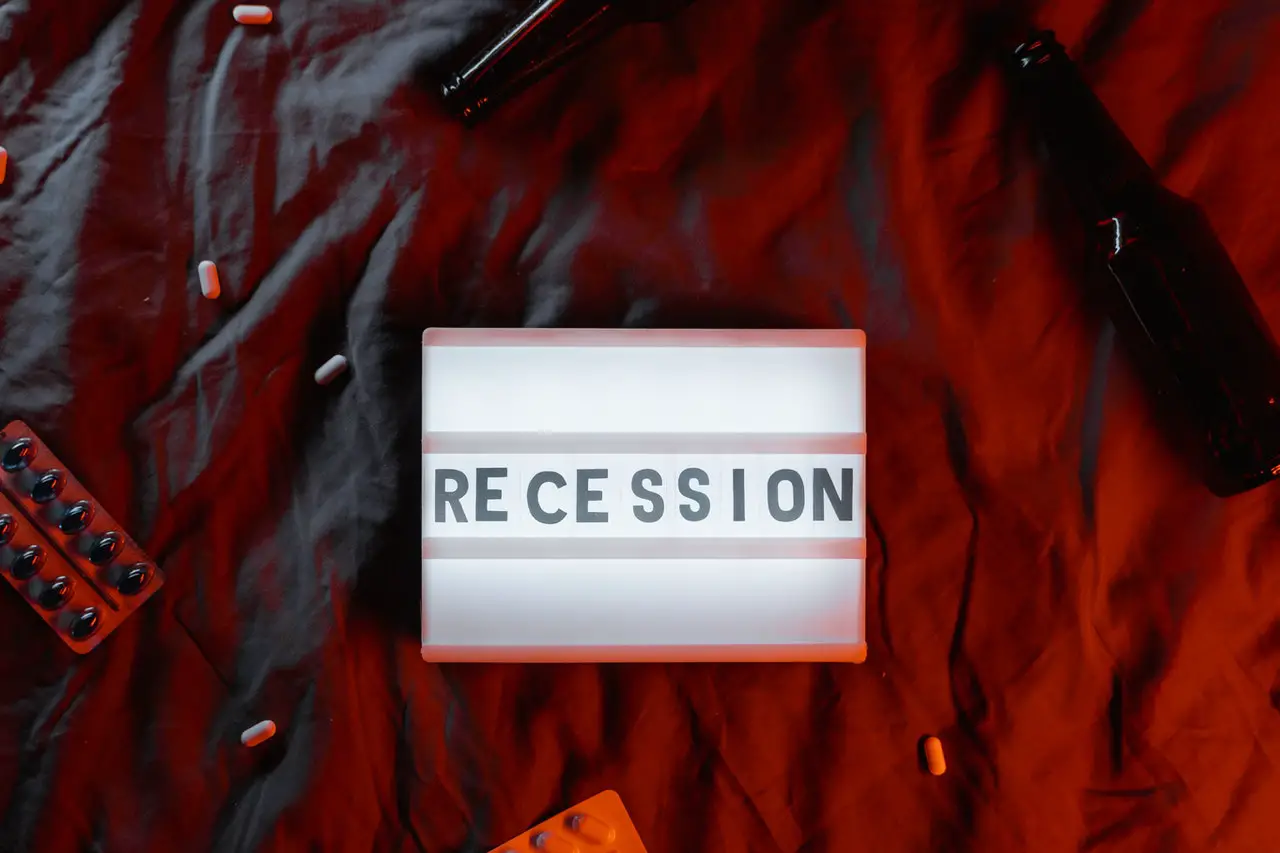You don’t have to be a world-renowned economist to see the financial storm clouds brewing all around us.
Inflation is through the roof. Supply chains are still incredibly disrupted. Wages are stagnating. Businesses are struggling.
It’s getting ugly out there.
But while there may not be anything you can do personally to stop the recession from unfolding at this point, that doesn’t mean that you are powerless.
There are some very real things (very important things) you can do – right now – to protect yourself, your loved ones, and your finances from this recession.
Below we highlight five things steps you want to take ASAP to better blunt the initial damage the recession will do to all of our financial situations, but also to set yourself up for financial success even while the economy in general starts to get lumped up.
Let’s jump right in.
Create an Emergency Fund
Straight out of the gate, it’s important to remember to keep your head – especially if things get really bumpy.
This isn’t the first time the United States has gone into a recession. It isn’t going to be the last time, either.
That said, it’s not hard to get anxious, to feel stressed out, and to get overwhelmed when the whole economy looks like it’s flashing red emergency lights and sirens are going off.
A surefire way to keep your head during all of this insanity is to have an emergency fund set up and ready to rock and roll.
Numerous studies show that the overwhelming majority of Americans would struggle to pony up the dough for a $500 surprise emergency.
Think about that for second.
We recommend that you not only set aside $500 to cover that kind of emergency – but that you take things even further.
You should do your level best to have at least three months of monthly expenses set aside in an emergency fund that never gets touched. It’s even better if you can stretch that out to six months of monthly expenses (and better still if you can build that war chest up to a full year).
But at least three months will give you a lot of security and a lot of stability that you simply wouldn’t have had otherwise.
Start small, but start right now.
Find ways to set aside enough money to cover that $500 emergency. Then build up to a single month of expenses locked away, building up to at least three months (and ideally even more).
You’ll be in a great position to weather the storm when you have that kind of foundation underneath you.
Pay Off Your Debt
Next, you want to do everything you can to pay debt down – aggressively – before the recession really takes hold.
Target high interest rate debt (credit cards especially) and just be relentless. Chunk away at it, throwing money from every single paycheck at your debt, and trying to get it down to zero if at all possible.
The last thing you want to have to worry about when you’re seeing the economy start to nosedive is how you’re going to service a mountain of debt squarely resting on your shoulders.
It’s hard enough trying to figure out how you’re going to make ends meet when the economy is in trouble. It’s something else entirely to have to worry about tons and tons of debt dragging you down at the same.
Make the necessary sacrifices now (before things get too rough) to get that debt cleaned up and you’ll be in a much better position.
Invest in Yourself
One of the particularly nasty things about recessions is that they are a ripe situation for businesses to wipe out employees, ruthlessly cutting people off of the payroll – starting with those that they deem to be the least valuable to the company.
And while you may not be able to take full control of how your company sees you (or how they value you), you do want to do absolutely everything you can to invest in yourself, invest in your impact to your company, and invest in how you demonstrate that value to the decision-makers.
Make sure that you are seen as a valuable asset.
Sometimes that means putting in extra time, putting in extra effort, or bringing unique skill sets to the table compared to other employees that may be simply “punching the clock”.
You have to prove your value in recessionary environments.
It’s not the most fun thing to do in the world (especially if you haven’t had to go through this before), but it sure beats the alternative – being seen as a drag on the company and getting shown the door when companies aren’t hiring like they used to.
Build Additional Income Streams
Of course, another thing you’ll want to consider is to build out multiple streams of income that can help supplement – and may even have the potential to replace – the income that you’ve been relying on all along.
Multiple streams of income are always a good idea (in good financial times and bad), but they become really important when we are facing a recession.
Build out a side hustle that you can work on during your free time. Find ways to generate money from things you enjoy doing while “off the clock” – or find ways to leverage your professional skills to make more money than you would have been able to at your day job.
This may not be the easiest thing in the world to pull off, but it is essential.
There’s nothing worse than having a single point of failure when it comes to your finances.
A lot of people learn the hard way during recessions that one job (or even two jobs) are nowhere near as secure as they would lead them to believe. The last thing you want to have happen is your single source of income to be shut off, leaving you to scramble (especially when everyone else is scrambling at the same time).
With multiple streams of income you have built in redundancies and built-in resiliency.
One of your side hustles could go belly up, but if you have multiple other streams of income it’s not hard to test or tweak offers to replace the income that disappeared – or even expand on it.
There’s a reason why almost every millionaire has (on average) seven different streams of income to rely on.
Don’t get caught flat-footed with just a single source.
Not with a recession looming.
Generate New Opportunities
It may not look like the best time to get into the stock market or real estate market (or even the best time to buy businesses or other income producing assets) on the surface, but massive fortunes have been built during economic hardships like this.
A lot of extremely wealthy people throughout history have chosen to look at recessions in as positive a light as possible, hunting for a silver lining – the opportunity to get in on assets and investments at deeply discounted prices, the kinds of prices they never would have seen if the economy was chugging along smoothly.
We may be looking at a very rough economic situation for the next couple of years.
At the same time, though, those that are hunting for opportunities to “buy assets at a discount” are going to find them – and find them by the bucketful.
It’s going to take some courage. It’s going to take a lot of research and due diligence. And it’s going to take a little bit of risk to jump on board the opportunities you find while the economy is struggling.
All it takes, though, is one of those assets or one of those opportunities to pay off and you may be able to totally transform your financial future from here on out.
Just because the market or the economy goes into a tailspin doesn’t mean that you want to stop looking at income producing assets, that you want to stop checking the stock market, or that you want to forget about buying property or businesses.
In fact, you want to do the opposite!
Search even harder for income producing assets at a discount. Look for stocks “on sale” at prices you wouldn’t have been able to get them at otherwise. Hunt for properties and businesses that are great deals today, but will be even better deals when the market inevitably rebounds.
Closing Thoughts
At the end of the day it’s important to remember that the recession is part of the natural cycle of economic seasons.
We have boom times and we have bust times.
We have an economy that is screaming along like a rocketship and then we have an economy that starts to drop faster than an elevator.
We have spring and summer, when everything looks fresh and exciting. But we also have fall and winter when the situation gets chilly and we have to be a little smarter without finances.
Focus on the five tips, tricks, and strategies we highlighted above, though, and you’ll be able to get through this recession with a lot less stress, a lot less headache, and plenty of opportunities to actually grow and improve your financial situation, too.
References
https://www.nbcnews.com/better/lifestyle/10-step-guide-recession-proofing-your-finances-ncna1059021
https://money.usnews.com/money/personal-finance/articles/preparing-your-finances-for-a-recession
https://www.cnbc.com/2022/05/07/worried-about-a-recession-heres-how-to-prepare-your-portfolio.html
https://www.yahoo.com/video/manage-money-during-recession-according-090000362.html
https://www.businessinsider.com/how-to-manage-money-finances-during-a-recession-2020-8





